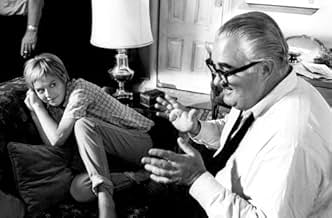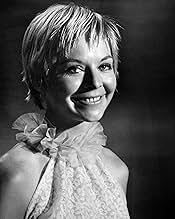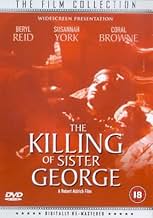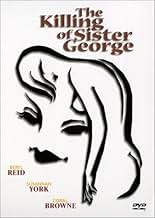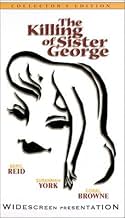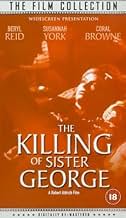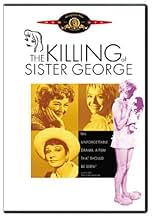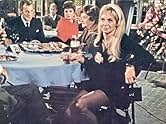IMDb-BEWERTUNG
7,0/10
2696
IHRE BEWERTUNG
Das Leben einer Seifenopernschauspielerin beginnt in dem Moment aus den Fugen zu geraten, als sie befürchtet, dass ihre Rolle aus der Serie gestrichen werden könnte.Das Leben einer Seifenopernschauspielerin beginnt in dem Moment aus den Fugen zu geraten, als sie befürchtet, dass ihre Rolle aus der Serie gestrichen werden könnte.Das Leben einer Seifenopernschauspielerin beginnt in dem Moment aus den Fugen zu geraten, als sie befürchtet, dass ihre Rolle aus der Serie gestrichen werden könnte.
- Regie
- Drehbuch
- Hauptbesetzung
- Auszeichnungen
- 1 Nominierung insgesamt
Empfohlene Bewertungen
Am I the only one who finds it painfully touching that Robert Aldrich went from the biggest hit of his career--the almost woman-free DIRTY DOZEN--to the kind of movie he really wanted to make, i.e., a stagebound melodrama about an aging lesbian soap star's love for a demented nymphet? In its day, SISTER GEORGE was considered the ne plus ultra in coarse homophobia; critics saw the sweaty thumbprints of the Aldrich Touch on every girl-on-girl scene. (Does anyone now lambaste THE BITTER TEARS OF PETRA VON KANT for not being hardhitting docudrama?) In retrospect, the movie seems to me one of Aldrich's most affecting, with Coral Browne (December) and a teeny, teenaged Susannah York (May) grand-slamming this folie a deux to a fare-thee-well.
I don't give many movies 10/10, but this black comedy-drama gets my vote, for fine acting, production values, and of course its place in movie history in the frank portrayal of lesbian relationships.
Others have & will comment on the latter, so I'll point out some of the other aspects of this fine film. The combination of comedy with personal tragedy poses difficult problems both for the writer & director; here they both succeed brilliantly.
The three principals' performances are riveting. I particularly liked the ambiguity of Coral Brown's portrayal of Mercy Croft; watch her carefully in the tight closeups in the gay club, and notice how the down-turned mouth at times hides a hint of a self-satisfied smile.
The cinematography deserves special mention. The use of colour is beautiful; I was reminded of "The Umbrellas of Cherbourg", but it never steps over the line into unreality. On the contrary, the alleys of London, the TV studio and above all the stairs and corridor of the flat are supremely realistic. Most unusual is the use of chiaroscuro, the interplay of light-and-shadow, seldom seen outside of black & white films. In so many colour films the light appears to come from some amorphous omnidirectional source out of science fiction; great for lighting everything and everybody evenly, but unrealistic and DULL. Look at the shadows as Beryl Reid ('George') enters the apartment building and climbs the stairs, or in some of the bedroom scenes. Apart from its other many virtues, this movie held my attention as a fine piece of film-making.
All in all, a masterpiece; my one regret is that it was shown on TV in pan-and-scan. It IS now available in DVD - in several formats & regions - so I look forward to watching it again in its original form.
Others have & will comment on the latter, so I'll point out some of the other aspects of this fine film. The combination of comedy with personal tragedy poses difficult problems both for the writer & director; here they both succeed brilliantly.
The three principals' performances are riveting. I particularly liked the ambiguity of Coral Brown's portrayal of Mercy Croft; watch her carefully in the tight closeups in the gay club, and notice how the down-turned mouth at times hides a hint of a self-satisfied smile.
The cinematography deserves special mention. The use of colour is beautiful; I was reminded of "The Umbrellas of Cherbourg", but it never steps over the line into unreality. On the contrary, the alleys of London, the TV studio and above all the stairs and corridor of the flat are supremely realistic. Most unusual is the use of chiaroscuro, the interplay of light-and-shadow, seldom seen outside of black & white films. In so many colour films the light appears to come from some amorphous omnidirectional source out of science fiction; great for lighting everything and everybody evenly, but unrealistic and DULL. Look at the shadows as Beryl Reid ('George') enters the apartment building and climbs the stairs, or in some of the bedroom scenes. Apart from its other many virtues, this movie held my attention as a fine piece of film-making.
All in all, a masterpiece; my one regret is that it was shown on TV in pan-and-scan. It IS now available in DVD - in several formats & regions - so I look forward to watching it again in its original form.
Anyone who likes gritty, clever, slightly comical drama should see this one. The plot is simple enough - an alcoholic gay actress worried about her future in a top Coronation Street-style soap opera - but the way the film is put together is pithy without being too complex - the characterisations are brilliantly satirical, showing up the worst side of the soap opera industry and its catty, backstabbing nature. You don't find yourself feeling sorry for anyone at the end of it apart from perhaps Susannah York. Lots of London-in-the-1960s location filming and familiar faces - I'm only surprised that John Le Mesurier doesn't appear in it. In a word - absorbing. Why don't they make them like this anymore?
I did not see the stage play upon which this film is based (too young) but, based on its own merits, this film surely deserves a closer look.
The central trio of performers (Reid, York, Browne) provide career "bests" and there are some amusing vignettes from the others (Fraser, in particular, as a truly odious soap actor).
The much-discussed sex scene is, by today's standards (and, it would seem, even those of the 1960s stage play), tame, but its real value as a display of the shift of power between the three central characters is very neatly worked through in the closing quarter.
The final five minutes of (self-) destruction is heartbreaking, with excellent use made of the music track.
In short: miss it and miss out.
The central trio of performers (Reid, York, Browne) provide career "bests" and there are some amusing vignettes from the others (Fraser, in particular, as a truly odious soap actor).
The much-discussed sex scene is, by today's standards (and, it would seem, even those of the 1960s stage play), tame, but its real value as a display of the shift of power between the three central characters is very neatly worked through in the closing quarter.
The final five minutes of (self-) destruction is heartbreaking, with excellent use made of the music track.
In short: miss it and miss out.
Beryl Reid gives a no-holds-barred performance as an aging lesbian actress who's already teetering on the edge when she gets word that her character in a TV soap opera is to be killed off. She takes out her frustrations on her childlike lover (Susannah York) and a production head (Coral Browne), the two of whom eventually become intimate on their own. The script-reading sequence had me howling with laughter, and Reid's non-stop barrage of put-downs, insults, wisecracks and other hateful remarks are acidly hilarious. A surprisingly realistic sex scene near the end is pretty graphic for its time (I almost felt like looking away) and we never learn much about Browne's icy character, but the concluding scene is gut-wrenching, as is the final line of dialogue. *** from ****
Wusstest du schon
- WissenswertesThe lesbian lovemaking scene so disgusted Robert Aldrich's longtime composer friend Frank De Vol that he quit the production and didn't work with Aldrich for several years.
- PatzerWhen George asks for a pint of beer the waiter arrives with it on a tray and it is half full with half a glass of head but when he puts it on the table it's much fuller, with only about an inch of head on it.
- Crazy CreditsDuring the opening credits, the picture distractingly flips from left to right as the main character travels through claustrophobia-inducing alleyways.
- VerbindungenFeatured in Before Stonewall (1984)
Top-Auswahl
Melde dich zum Bewerten an und greife auf die Watchlist für personalisierte Empfehlungen zu.
- How long is The Killing of Sister George?Powered by Alexa
Details
- Erscheinungsdatum
- Herkunftsland
- Sprache
- Auch bekannt als
- The Killing of Sister George
- Drehorte
- Produktionsfirmen
- Weitere beteiligte Unternehmen bei IMDbPro anzeigen
- Laufzeit2 Stunden 18 Minuten
- Sound-Mix
- Seitenverhältnis
- 1.85 : 1
Zu dieser Seite beitragen
Bearbeitung vorschlagen oder fehlenden Inhalt hinzufügen

Oberste Lücke
By what name was Das Doppelleben der Sister George (1968) officially released in India in English?
Antwort

